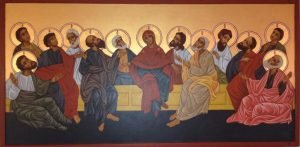 The first reading assigned for the 11th weekend after Pentecost is taken from St. Paul’s first letter to the Corinthians (1 Cor 9:2-12). In the portion of his letter that we proclaim, Paul is asserting his right as Christ’s legitimate Apostle. Paul was being criticized for not using the rights of his apostolate. Some were concluding that his non-use of such rights was proof that he was not really an apostle. Paul lists, besides his freedom in matters of food and drink, two other apostolic rights that he freely renounced – marriage and support from the churches.
The first reading assigned for the 11th weekend after Pentecost is taken from St. Paul’s first letter to the Corinthians (1 Cor 9:2-12). In the portion of his letter that we proclaim, Paul is asserting his right as Christ’s legitimate Apostle. Paul was being criticized for not using the rights of his apostolate. Some were concluding that his non-use of such rights was proof that he was not really an apostle. Paul lists, besides his freedom in matters of food and drink, two other apostolic rights that he freely renounced – marriage and support from the churches.
Paul defends himself against the Corinthians. He doesn’t let the attacks of others stop him from professing Jesus Christ. An important point.
Our second reading is a parable that Jesus uses to respond to Peter’s question: “Lord, when my brother wrongs me, how often must I forgive him? Seven times?” Jesus’ response to Peter is summed up with these words: “My heavenly Father will treat you in exactly the same way (that you treat others) unless each of you forgives his brother from his heart.”
Probably the corner stone of all of Jesus’ teaching is summarized in these words: “Do unto others as you would have them do unto you.” This means that we must always judge our interactions with an understanding of how we treat others and, if they don’t treat us in the way we expect, we forgive them. Why? Because they don’t know what they are doing, according to Jesus. We are called to live in accord with our values and our beliefs and not base out actions on the actions of others.
We are called to embrace the Way of Jesus because we understand that it makes us truly the children of God. If we base the way we treat others on the way that they treat us, we are no better that them. We always treat others as we think God, in the Person of Jesus, would treat others. Again, this helps us grow as children of God. If we treat others as they treat us, we don’t grow as children of God.
This, I know, goes against the way our modern society lives. Too many people base their behaviors on the behaviors of others instead of on the basic values by which they have freely chosen to live.
A part of salvation is learning how to live by our beliefs. If we truly believe that Jesus is the Way, the Truth and the Light, then we must freely chose to live in accord with His teachings and His way of living. We must choose to be children of God.
